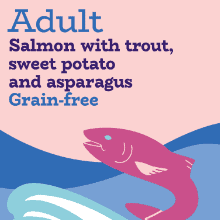What is EPI (Exocrine Pancreatic Insufficiency)?

If your dog has Exocrine Pancreatic Insufficiency (EPI) it basically means there is a progressive loss of digestive enzymes needed for your dog to break down and absorb their food properly.
The progressive loss of pancreatic cells that produce these enzymes is most commonly caused by pancreatic acinar atrophy. (See more below).
Suggested recipes for EPI
The atrophy itself can be the result of a previous infection, a blocked pancreatic duct or it can be simply down to genetics. Loss of digestive enzymes leads to digestive issues and malabsorption of nutrients which is why dogs with EPI struggle to maintain their weight, and are therefore constantly hungry, even though they can eat copious amounts of food.
Other causes leading to this condition include:
- Chronic pancreatitis: This is a long-term inflammation of the pancreas that can lead to EPI over time.
- Pancreatic cancer: Tumors in the pancreas can disrupt the production of digestive enzymes, leading to EPI.
- Trauma to the pancreas: Any injury or trauma to the pancreas can damage or destroy the cells that produce digestive enzymes.
They can even literally waste away, even die a painful death from malnourishment, starvation or organ failure. A lack of nutrient sometimes even results in temperament changes which may express themselves in aggression or even fear! Absolutely not what we want to see.
Pathogenesis, or where do we see EPI, in dogs?EPI is most commonly found in German Shepherds (around 60% of all cases) where it is predominantly an inherited condition (passed down from a dog's parents). Other breeds are now also being reported as showing signs of EPI as well, such as Border Collies, Boxers, Cairns, Cavaliers, Chihuahuas, Cocker, Dachshunds, Jack Russells, Labradors, Retrievers, Rottweilers, Schnauzers and westies! It is also worth noting however, that this is not an exhaustive list, and not the only breeds now known to be affected, simply the most common.
Typical Symptoms of EPI in dogs
In most cases, not until 80-90% of the pancreas has lost the ability to secrete the proper digestive enzymes will the symptoms present themselves. What makes it even harder to diagnose is that not all dogs display any or all of the symptoms all the time. The diet will often need complementing with additional enzyme powders and in some cases a boost of vitamin B12 injections
The most common symptoms include:
- A gradual wasting away, even though there is a voracious appetite
- Defecating more frequently
- Stools are often greasy, voluminous, yellowish cow-plops, but can also be greyish
- Eating their own stools or other inappropriate substances
- Increased passing of wind
- Increased rumbling sounds from the abdomen
- Experiencing intermittent watery diarrhoea or vomiting
- Some dogs even display personality changes such as fearfulness or sudden aggression
- It is also worth noting - not all dogs display the typical signs
Diagnosis of Exocrine Pancreatic Insufficiency in Dogs
If you suspect that your dog has EPI, you should take them to the vet for a thorough examination. Your vet will likely perform some diagnostic tests, such as blood tests and fecal analysis, to determine if your dog has EPI. These tests can measure the levels of digestive enzymes in your dog's blood and feces, as well as check for any signs of inflammation or infection.
What's the treatment for EPI in dogs?
If your dog is diagnosed with EPI, there are several treatment options available. The most common treatment is enzyme replacement therapy, which involves giving your dog synthetic digestive enzymes in the form of a powder or tablet with their food. Your vet will likely recommend a specific brand and dosage based on your dog's weight and condition.
In addition to enzyme replacement therapy, your vet may also recommend a special diet for your dog that is easy to digest. This can help to support your dog's digestion and provide them with the nutrients they need to maintain their health.
How does a grain and cereal free diet help?
It is the wheat gluten and other grains/cereals typically found in other brands of dog food that EPI sufferers have particular problems digesting. All our recipes are wheat gluten free. And many of our recipes have no grains or cereals in them, see our range of Grain free dog food, which have no cereals either. We have had excellent results with EPI dogs that have been fed our Duck & Potato dog food recipe, as shown with the numerous testimonials we have received.
Conclusion
Exocrine pancreatic insufficiency is a serious condition that can cause a range of health problems in dogs. If you suspect that your dog has EPI, it's important to seek veterinary care right away. With proper diagnosis and treatment, most dogs with EPI can lead happy, healthy lives.
Photo by Anna Dudkova


.png)

